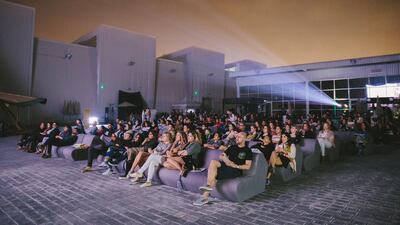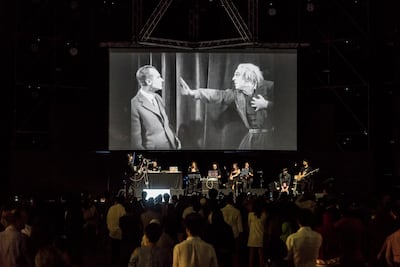This autumn, the first fully fledged arthouse cinema in the Gulf will open in Dubai: Cinema Akil, a place committed to the idea that cinema brings people together. Or, as Cinema Akil’s founder, Butheina Kazim, puts it, cinema as “a shared journey into the dark”.
Cinema Akil is a familiar institution to filmgoers in the Emirates. In the nearly four years since it was founded, it has staged more than 40 pop-up series, partnering with institutions from Warehouse421 in Abu Dhabi to the Sharjah Art Foundation to Van Cleef & Arpels in Dubai.
It has attracted a loyal following of cinephiles, but throughout Kazim has waited for a bricks-and-mortar space, arguing that a cinema can offer an audience things that the films themselves cannot. Now, she will get a chance to test this proposition: Cinema Akil will put down roots in a corner of Alserkal Avenue, in a purpose-built space suffused with the rituals of movie-going.
Working to bring people together
"We're focusing on all the ancillary elements of film," she says. "It would have made my life a lot easier if I took over a screen at Vox and tried to programme it. And we've been invited to do that. But I don't believe that film is just about the film. The film is the lynchpin, but then there's everything else around it – there's the spatial element, even the snacks that we choose, the smell of Mirzam's locally grown chocolate" from the shop next door. "As romantic and hipster as that might sound, there's a certain degree of investment that only comes with time and rigour for an endeavour such as a community or an arthouse cinema."
Kazim is a woman who speaks in full paragraphs. She connects a subject's socio-political significance easily with its emotional resonance; listening to her is a little like listening to a Ted talk. For her, installing an arthouse cinema in Dubai not only gives visibility to independent, challenging and historical films, but brings people together in a city where they are often separated by language, nationality or simply the architecture of a place designed for cars.

“There is the magic of cinema and the egalitarian nature of accessibility to the language of film,” she says. “But then there’s the bigger picture, which is the thing that film allows to happen in the space of a cinema. That’s why I insisted on having a site. A lot of the standalone cinemas are gone, and there are very few spaces where you can sit with the film. That’s where the magic happens: the few moments after a film where people are settling in and looking at each other and trying to understand what happened, or that shared disgruntlement sometimes, or exasperation, or shared joy. It’s kind of like travelling together.”
What's it going to look like?
For Cinema Akil, she will cover the walls in dark-red paper and old film posters (last summer, Cinema Akil trialled the cinema in the warehouse that will now become their permanent space). She has salvaged seats from the balcony of the Plaza (later Golden) Cinema in Bur Dubai – the oldest single-screen standalone cinema in Dubai, which was knocked down three years ago to make way for a hotel. Peering at Cinema Akil, currently under construction, I spied these seats through the dust: upholstered in red vinyl with blue piping, with tall backs and headrests like those in aeroplanes. They'll be given a slight update – as will other aspects of the cinema. A thirty-seat café operated by Chaiwala will offer chai all day, and the smell of artisanal chocolate will mix with that of popcorn.
______________
Read more:
Beyond the multiplex: a look at the arthouse film scene in the UAE
Dubai loses a piece of history as Golden Cinema prepares to close
Abu Dhabi institution El Dorado to close its doors after 47 years
______________
The idea of the cinema as a special place where communities gather has become part of the lore of film – particularly as cinemas come under threat from other ways of watching film, such as streaming services like Netflix. According to one recent survey in the US, more than half of respondents prefer watching films at home rather going to a movie theatre. Cinemas are now often positioned as parts of the public sphere, sites of shared cultural enjoyment on a par with museums and opera houses. This elevated cultural status masks an economic reality: cinemas are institutions that are worth preserving, rather than entertainment companies that are economically self-sufficient.
'We’ll show films that make Dubai the city it is'
However, like much else, this logic works differently in the Gulf. In Saudi Arabia, the opening of movie theatres has been heralded as a huge event, as well as a money-making opportunity, even though video on demand had made films already available to most Saudis. And in Dubai, where "the historical trajectory of art forms doesn't follow the same story as elsewhere" as Kazim put it, she is betting that a cinema with a well-considered programme such as Cinema Akil's will play an important, even disruptive role. It aims to give a more nuanced representation of Arab culture – her most recent series with Warehouse421 was around Arab sensitivities and vulnerabilities – and to reach out to new demographics. "We'll show films that make Dubai the city it is: films that are from the larger production space of South and West Asia, the Mena region, East Africa," Kazim says.
Throughout Cinema Akil's nomadic existence, Kazim's pop-up programmes have engaged different audiences: from the hip-hop films she presented at the street culture festival to the Cineconcert Festival in Dubai Design District, in which silent films were accompanied by electro-shaabi music from Egypt. Many of these films wouldn't be available here if it weren't for Kazim's persistence in bringing them to the screen – she moved the date of the opening for last year's Now Playing, the pop-up series in Alserkal Avenue, to hottest July just so that she could show Raoul Peck's I Am Not Your Negro before its contract for video on demand came up.
“The distributor who bought the rights was going to go straight to VOD, and I was like, no, just wait one more week – we’re going to open the space!” she says. “I was thrilled. It was an embodiment of why we wanted to do this work. I still have interactions with people who talk about their Cinema Akil experience being defined by that film.”
How Cinema Akil came to be
Kazim’s husband, the political analyst Mishaal Al Gergawi, had an idea for an arthouse cinema at the Dubai World Trade Centre in 2008 that he named Cinema Akil, after his late uncle, but abandoned the project because of the financial crisis. Years later, Kazim took the idea in a different direction, but kept the name. “The name Akil means ‘he who possesses wisdom and knowledge’, so it’s the personification of the individual who would be receptive to these films that we are presenting.”
Kazim’s Cinema Akil began in 2014 on the rooftop of the Third Line Gallery in Al Quoz – in its former, non-Alserkal Avenue site – and its roving period drew on longer than she imagined. “I did have my doubts throughout the process because it took three years – we shifted to three different warehouses, we hired three contractors, four architects.”
She secured the permissions earlier this month and started building immediately. From this autumn, she can simply put on films, she says, rather than working out projectors, seating and all the paraphernalia for each programme. Cinema Akil is slated to have six screenings a week – two on weekdays and four at the weekends – and might one day extend in the Emirates, to cinemas in Abu Dhabi and elsewhere in Dubai.
"The industry is changing," she says. "But the thing that doesn't change – again, it's hopelessly romantic – is the desire for human life to congregate around stories."



